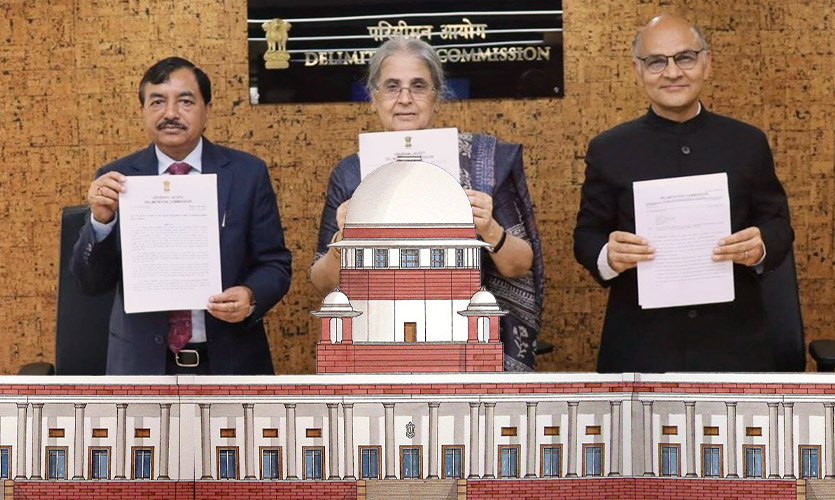Responding to a petition against the Delimitation Commission order in Jammu and Kashmir, the Centre has told the Supreme Court that the proposed delimitation has been finalised, and that there is no scope for any kind of judicial interference in the same.
The Centre presented its reply in a response to a petitioner from the J&K Union Territory who had approached the apex court against the rescheduling of constituencies and increasing the assembly seats from 83 to 90.
According to the Home Ministry’s affidavit that was submitted in the Supreme Court, no legal process can be started to check its validity if the orders of the Delimitation Commission are published in the Union Gazette and implemented under the Delimitation Act, 2002.
Earlier in March, a petition was filed against the delimitation process by a Jammu & Kashmir petitioner, citing that the notification for the constitution of the Delimitation Commission to delimit the Legislative Assembly of Kashmir is “unconstitutional”. The petitioner had claimed that the central government has done this exercise by going outside its jurisdiction.
The Centre has asked that the petition be quashed. “If the court accepts the arguments of the petitioner, it will lead to an odd situation wherein orders of the Delimitation Commission, which attain finality at the time of publishing in the Gazette of India, would be rendered infructuous,” read the affidavit.
The government further added in its reply that the entire effort may be ineffective because of the petition, and that entertaining it would be a violation of Article 329 which states that the court cannot interfere in electoral matters.
The central government stated in its the affidavit:
“The 2002 Act is a special legislation which provides for the establishment of a Delimitation Commission for the purpose of providing for the readjustment of the allocation of seats in the House of the People to the States, the total number of seats in the Legislative Assembly of each State, the division of each State and each Union territory having a Legislative Assembly into territorial constituencies for elections to the House of the People and Legislative Assemblies of the States and Union territories and for matters connected therewith.”
Delimitation
On May 5, the Delimitation Commission for the Union Territory of Jammu and Kashmir, headed by ex-Supreme Court judge Ranjana Prakash Desai, had issued a final notification, recommending the addition of seven constituencies in the UT.
In order to increase the total number of seats from 90 to 83 for the J&K Assembly, it recommended six additional seats for the Hindu-majority Jammu and one for Kashmir. Currently, Jammu has 37 assembly seats while Kashmir has 46.
The commission also recommended nine reserve seats – six in Jammu and three in Kashmir. It also accepted the demand to merge Jammu’s Poonch and Kashmir’s Rajouri districts with Anantnag, forming a new parliamentary constituency of Anantnag-Rajouri .
The 24 seats in Pakistan-occupied Kashmir (PoK) will continue to remain vacant, according to the commission’s notification.
Read more: Could Allowing Non-Locals To Vote In Kashmir Be A Presumptuous Move?










